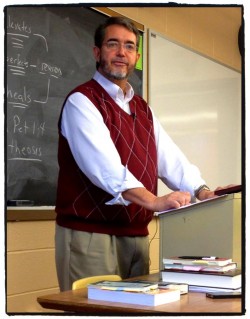
It was exhausting and exhilarating. Between the end of one semester and the beginning of the next, I spent ten days working to establish a more visible and permanent presence for the St. Paul Center in southern California—teaching, speaking, taping, consulting with bishops, meeting with scholars and Hollywood stars. At night I sometimes caught chill, and I had no appetite for eating. But I chalked it up to the frenetic activity.
I came home briefly only to set out again, this time to a conference in New England.
By the time I returned home, I could no longer blame my ill feelings on travel weariness. I had abdominal pain that grew more severe as the night wore on. I couldn’t sleep at all—though I felt completely worn out. At 3 a.m. the pain became unbearable, so I drove myself to the nearest hospital’s emergency room.
After a CAT scan, the doctor came to me with his brow furrowed and his tone urgent. He told me I had a perforated bowel, and it was leaking. Without immediate surgery, it would lead to sepsis within hours and most likely death.
It was the first time I’d ever heard my death spoken of as being potentially imminent.
Soon I would experience a string of other “firsts”: my first overnight stay in the hospital (it stretched into several days) … my first reception of the Anointing of the Sick.
I called my wife, Kimberly, and Father Ray Ryland, and they both rushed to the hospital. Via my Facebook status, I sent out a plea for prayers and was immediately answered, even at that late hour, by so many friends and well-wishers. The attendants made haste with care, administered shots and scrubs, and made small talk with me. When they found out what I did for a living—even then—the conversation turned to the faith. The last thing I remember before the anesthesia took over was talking with the anesthesiologist about coming back into the Church.
Then I was under the knife and under the mercy. Hours later I came out of the fog feeling tremendous pain, but great gratitude, too. With time to think, I regretted the many “lost opportunities” for evangelization in the coming weeks. I knew I would be laid up, perhaps for a month, and I would miss classes and conferences and have to cancel speaking engagements.
It was hard to give in to self-pity, as I was the recipient of the finest professional care—from specialist doctors, nurses, aides, and orderlies. And it really was care. They cared. And each one had a story. And one thing led to another, and we talked about the faith.
What I soon discovered is that there would be no “lost opportunities”—just slightly shifted opportunities. I had to call Kimberly and ask her to bring a box of books to my hospital room, for distribution as the occasions called for them. And the occasions were many!
Even if you knew none of this till now, I thank you, because I know I am alive, and almost well, today because of the prayers of people who prayed for me. In less than a week I was back in the classroom. What a joy to launch my new course, “The Theology of the New Evangelization,” on the Feast of the Conversion of St Paul. Two hours and forty minutes never went by so fast. I got to re-discover what St Paul taught and lived so well: “My grace is sufficient for you.” One week before it had not seemed possible.
I’ve now received a clean bill of health — stitches out and no further surgery required.
So, as you and I continue our Lent together, let’s remember God’s dual call to each of us. We share the vocation to holiness and to the apostolate. Like Christ, we grow in holiness by offering up our suffering. And, even as we suffer, we witness. Wherever we go, we witness. We don’t need pulpits or books or microphones.
We need God, and more of him. And we need one another. I need your prayers. And I promise you mine.